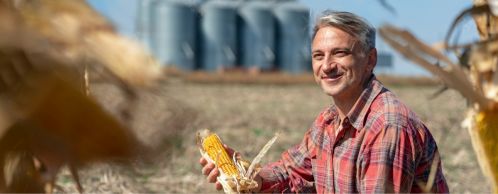
Feeling Wiped Out? You’re Not Alone.
Article By: Jen Pino-Gallagher of M3 Insurance
The phrase "pandemic fatigue" was originally used in the medical and public health communities to describe the dwindling energy within society to continue combatting the pandemic (wearing masks, getting vaccinated, social distancing, etc.)
However, today we believe this level of fatigue also applies to the mental, physical, and emotional impact that comes from living through a once-in-a-lifetime pandemic, increasing rates of inflation, high input costs, unpredictable weather, and uncertainty in the global commodity markets.
It's greater than pandemic fatigue - it's "life fatigue".
Physical fatigue is understood in the farming industry. Farming is hard, physical work. But "life fatigue" goes beyond the feeling of tiredness, which can often be fixed by getting good rest.
How does life fatigue affect farmers?
One aspect of farming that contributes to stress and mental fatigue is its occasional solitary nature. The isolation that sometimes accompanies farm work can exacerbate the feelings referred to as “life fatigue”.
- The Rural Resiliency Project was started with seed money from the University of Wisconsin-Eau Claire Foundation. The purpose of the project is to increase the resiliency and promote the vibrancy of rural Wisconsin focusing primarily on farmers, farm families, and those in related agricultural fields. Their programs seek to improve the lives of farmers and enrich our understanding of the impact of farms, farmers, and agriculture on rural Wisconsin and beyond. Available offerings include virtual programming on the human side of farm transitions and a series for women juggling it all. For more information, visit: https://www.facebook.com/The-Rural-Resiliency-Project-102356922531665
- Wisconsin Farm Center offers farmer wellness support services. These include counseling services provided by mental health professionals through the 24/7 Farmer Wellness Helpline, tele-counseling, counseling vouchers, and farmer online support groups. For more information, visit: https://datcp.wi.gov/Pages/AgDevelopment/FarmCenterOverview.aspx
- University of Wisconsin Extension helps farmers, families, businesses, and communities remain resilient by learning how to manage stress and use planning tools to make sound decisions and create a road map for the future. For more information, visit: https://farms.extension.wisc.edu/farmstress/
The federal government has also taken notice of the mental health challenges and is supporting them through grant funding and resources for the farming and agribusiness community.
- Upper Midwest Agricultural Safety and Health Center's (UMASH) mission is to improve the health and safety of agricultural workers, owner-operators, and communities in the Upper Midwest. To reach UMASH, visit: http://umash.umn.edu/stress/
- National Institute of Food and Agriculture (NIFA) was created by the National Farm and Ranch Assistance Network which supports projects that provide stress assistance for people in farming, ranching, and other agriculture-related occupations.
- North Central Farm and Ranch Stress Assistance Center includes state-specific resources which can be found here: https://farmstress.org/wisconsin/



